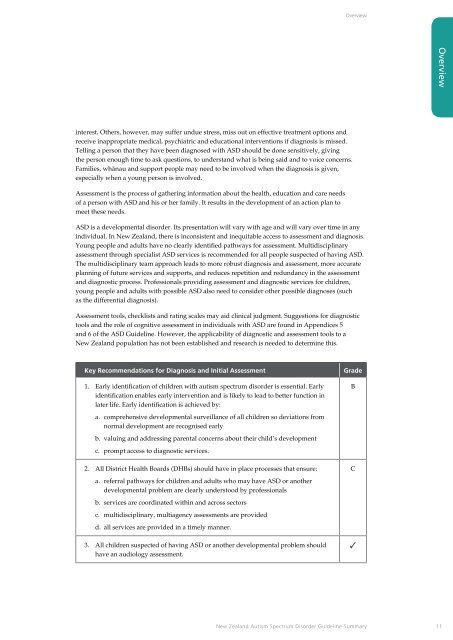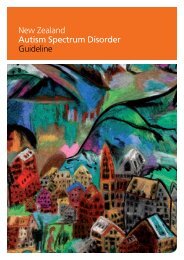New Zealand Autism Spectrum Disorder ... - Ministry of Health
New Zealand Autism Spectrum Disorder ... - Ministry of Health
New Zealand Autism Spectrum Disorder ... - Ministry of Health
Create successful ePaper yourself
Turn your PDF publications into a flip-book with our unique Google optimized e-Paper software.
Overview<br />
Overview<br />
interest. Others, however, may suffer undue stress, miss out on effective treatment options and<br />
receive inappropriate medical, psychiatric and educational interventions if diagnosis is missed.<br />
Telling a person that they have been diagnosed with ASD should be done sensitively, giving<br />
the person enough time to ask questions, to understand what is being said and to voice concerns.<br />
Families, whänau and support people may need to be involved when the diagnosis is given,<br />
especially when a young person is involved.<br />
Assessment is the process <strong>of</strong> gathering information about the health, education and care needs<br />
<strong>of</strong> a person with ASD and his or her family. It results in the development <strong>of</strong> an action plan to<br />
meet these needs.<br />
ASD is a developmental disorder. Its presentation will vary with age and will vary over time in any<br />
individual. In <strong>New</strong> <strong>Zealand</strong>, there is inconsistent and inequitable access to assessment and diagnosis.<br />
Young people and adults have no clearly identified pathways for assessment. Multidisciplinary<br />
assessment through specialist ASD services is recommended for all people suspected <strong>of</strong> having ASD.<br />
The multidisciplinary team approach leads to more robust diagnosis and assessment, more accurate<br />
planning <strong>of</strong> future services and supports, and reduces repetition and redundancy in the assessment<br />
and diagnostic process. Pr<strong>of</strong>essionals providing assessment and diagnostic services for children,<br />
young people and adults with possible ASD also need to consider other possible diagnoses (such<br />
as the differential diagnosis).<br />
Assessment tools, checklists and rating scales may aid clinical judgment. Suggestions for diagnostic<br />
tools and the role <strong>of</strong> cognitive assessment in individuals with ASD are found in Appendices 5<br />
and 6 <strong>of</strong> the ASD Guideline. However, the applicability <strong>of</strong> diagnostic and assessment tools to a<br />
<strong>New</strong> <strong>Zealand</strong> population has not been established and research is needed to determine this.<br />
Key Recommendations for Diagnosis and Initial Assessment<br />
1. Early identification <strong>of</strong> children with autism spectrum disorder is essential. Early<br />
identification enables early intervention and is likely to lead to better function in<br />
later life. Early identification is achieved by:<br />
Grade<br />
B<br />
a. comprehensive developmental surveillance <strong>of</strong> all children so deviations from<br />
normal development are recognised early<br />
b. valuing and addressing parental concerns about their child’s development<br />
c. prompt access to diagnostic services.<br />
2. All District <strong>Health</strong> Boards (DHBs) should have in place processes that ensure:<br />
a. referral pathways for children and adults who may have ASD or another<br />
developmental problem are clearly understood by pr<strong>of</strong>essionals<br />
b. services are coordinated within and across sectors<br />
c. multidisciplinary, multiagency assessments are provided<br />
d. all services are provided in a timely manner.<br />
C<br />
3. All children suspected <strong>of</strong> having ASD or another developmental problem should<br />
have an audiology assessment.<br />
<strong>New</strong> <strong>Zealand</strong> <strong>Autism</strong> <strong>Spectrum</strong> <strong>Disorder</strong> Guideline Summary 11











